Are you looking to build a nest egg without compromising your values?
You’ve come to the right place!
Just like you, a growing number of investors are pursuing business and sustainability objectives together through ethical investing – a trend that could put an end to the era of investments being used as a mere tool to achieve financial goals.
As investors become more conscientious, ethical investment is gradually becoming a crucial component of an investor’s portfolio.
In this article, we’ll share a guide to ethical investing in Australia that can help you earn profit with a purpose as you build and grow your investment portfolio.

Jump straight to…
What is Ethical Investing?
Ethical investing is an investment strategy that prioritises the investor’s moral, religious, and social ideals atop financial gain.
Due to incidents of questionable and shady business operations, investors have begun to demand that the companies they invest in be socially responsible.
This includes treating their employees with dignity, developing sustainable products and services, and refraining from unethical business activities.
Consequently, ethical investing is an opportunity for investors to invest in companies that adhere to values aligned with their own—using their money as a powerful tool to drive meaningful change in the world.
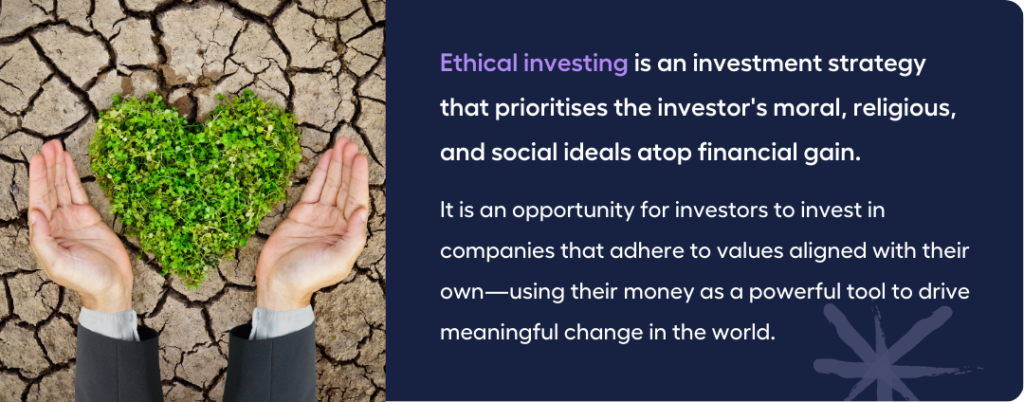
What are the Ethical Issues in Investing?
Ethical issues in investing can include concerns about the environmental and social impact of the companies in which one is investing, as well as issues related to corporate governance and the treatment of employees.
Other ethical concerns may include avoiding investments in companies involved in controversial industries such as tobacco or weapons manufacturing or investing in companies that adhere to certain religious or moral principles. Additionally, there may be concerns about insider trading, fraud, and other illegal or unethical practices in the financial industry.
While the values of each ethically conscious investor vary based on their personal preferences, there are particular areas where ethics play a significant role.
Here are some of the general ethical issues that investors consider:
- Environmental Responsibility
- Socially Conscious Investing
- “Sin” Industries
- Medical Taboo
- Gaining Market Leadership at the Cost of Others
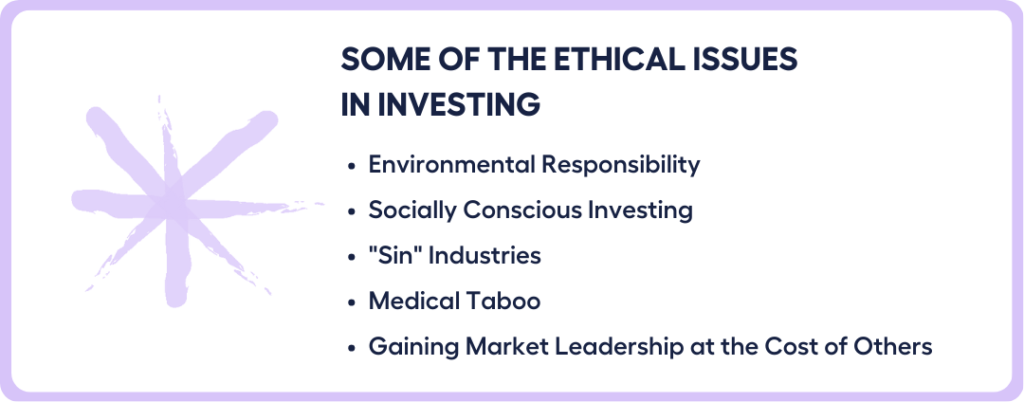
1
Environmental Responsibility
This is one of the more common ethical issues when investing, ensuring that the companies you invest in are actively contributing to the future of the planet.
Climate change has been thrust to the forefront of people’s consciousness in recent years, making it everyone’s responsibility to contribute to environmental protection.
With businesses having a considerably higher impact due to the intensity and volume of their carbon footprint, ethical investors have increased pressure on business owners to ‘walk the talk’ by meeting government emission requirements.
2
Socially Conscious Investing
Another factor that ethical investors consider is a company’s positive impact on society.
Business leaders have to deal with the emerging trend that earning society’s trust is critical to the success of their organisations.
This can take various forms, such as paying their employees a liveable wage and enacting equal rights rules, complying with Fair Trade principles, and directly improving the lives of their customers through the service they provide, or indirectly through charitable activities.
3
“Sin” Industries
Although the concept of a sinful industry is fairly subjective, a segment of the investing public believes alcoholic beverage manufacturers, tobacco corporations, casinos, and the pornography industry to be “sinful”.
Tobacco companies, for example, have long been accused of marketing to minors and making their products as addictive as possible to increase sales.
While these industries have made attempts to improve public awareness of the dangers of misusing their products and services, some investors may choose to shun companies in these industries.
4
Medical Taboo
Companies that profit from particular medical procedures or types of research are sometimes regarded as unethical, especially by certain religious communities.
5
Gaining Market Leadership at the Cost of Others
Although there will always be winners and losers in a free-market economy, some people are concerned about how a corporation wins.
Companies with monopolies in a market or industry can opt to operate efficiently in various ways. However, they may, in the process, effectively eliminate any healthy corporate competition, which some investors consider wrong.
By their very nature, ethics are morally subjective, and there is no single rule for what is or is not an ethical investment.
Investors have to consider what they think is moral and then try to use that as a guide for their investment decisions.

If you want to learn more about investing ethically, speak with My Money Sorted for free to connect you with the right adviser.
How to Ethically Invest
Considering that ethics are subjective, is it difficult to ethically invest in Australia or anywhere in the world?
Not necessarily.
If what you value in an investment is clear, ethical investing in Australia can be simple since you may use the same strategies and tools that you would typically use for traditional investments.
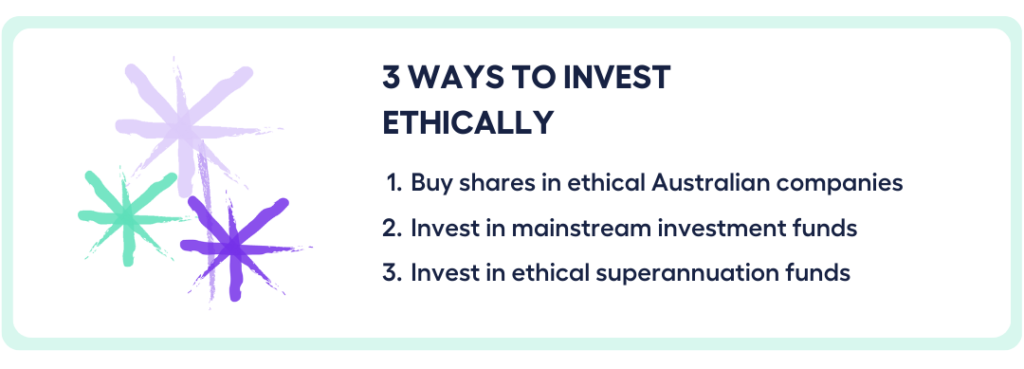
Here are 3 Ways to Invest Ethically:
- Buy shares in ethical Australian companies
Responsible and ethical investing allows you to “vote with your wallet” by investing directly in ethical businesses. This entails deliberately seeking out companies that align with what you value and your financial objectives.
- Invest in mainstream investment funds
To make the search simpler, the Responsible Investment Association Australasia (RIAA) has developed a Responsible Returns tool to help investors searching for ethical investment options based on the issues that are most important to them.
You can choose two causes you want to support, two issues you don’t like, and the type of investment product you want. The tool will then display a list of providers who have investment products that fit your requirements.
- Invest in ethical superannuation funds
You can direct your superannuation to ethical investment funds if you work in Australia. A list of Australian super funds has been identified by the RIAA based on five criteria for showing a comprehensive strategy to responsible investing.
Now, if you’re buying shares or going into investment funds, you might need a certain standard based on data to ensure that you’re indeed investing ethically.
As such, you may want to look into ESG investments.
ESG Investments
ESG investing stands for “Environmental, Social, and Governance” investing. It is an investment strategy that incorporates considerations of environmental, social and governance factors in the investment decision-making process.
This strategy aims to align the investor’s values with their investments by considering the impact of the company’s operations on the environment, its treatment of employees, customers, and communities, and its governance practices.
ESG investors attempt to ensure that the companies they support are responsible environmental stewards, excellent corporate citizens, and managed by accountable managers.
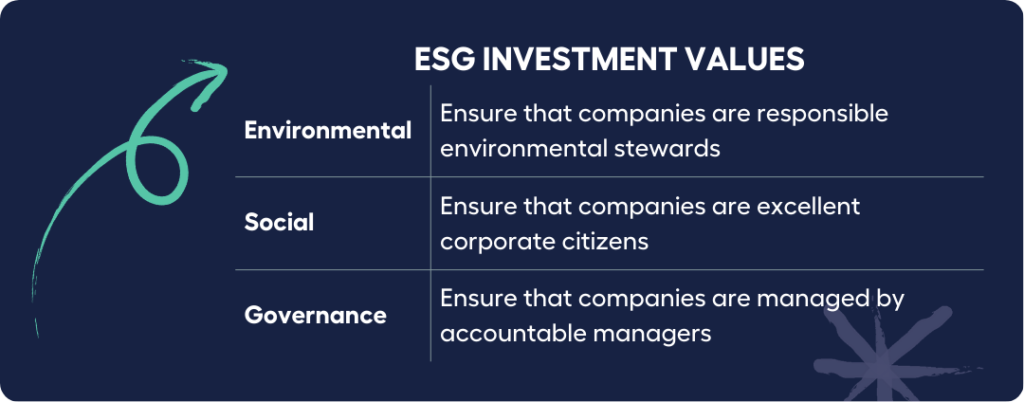
Environmental
How does a company affect the environment?
Investors and investment firms consider a corporation’s:
- climate policies
- energy use
- waste
- consumption
- pollution, natural resource conservation, and
- animal treatment.
ESG factors can also help analyse any environmental hazards that a firm may face and how those risks are managed.
Considerations may include direct and indirect greenhouse emissions, toxic waste management, and adherence to environmental requirements.
Social
What is the company’s social impact on its personnel and the community they are a part of?
Investors and investment firms examine the company’s relationships with internal and external stakeholders.
Socially responsible investing (SRI) is an investment approach that focuses on the social aspect of ESG.
Socially responsible investors look for companies that promote ethical and socially conscious principles, such as:
- diversity
- inclusion
- community focus
- social justice
- corporate ethics, and
- fight against racial, gender, and sexual discrimination.
Governance
How does the company’s executive management drive positive change?
ESG governance principles ensure that a firm uses accurate and transparent accounting processes, selects executives with integrity and diversity, and is accountable to shareholders.
ESG investors may demand assurances that corporations:
- avoid conflicts of interest in selecting board members and top executives
- do not use political contributions to get preferential treatment, and
- do not engage in illegal activity.
What is the difference between ESG and ethical investing?
Both ESG investing and ethical investing are on the same side of the table, but is there any difference between the two?
Ethical investors are solely interested in companies whose products, policies, and governance are aligned with their values, so they screen out those who do not make the cut.
In ESG investing,
- fund managers or investors consider investment in firms that have good environmental, social, and governance scores, while also maintaining the same level of financial returns that they would achieve with a standard investment approach.
A company with a high ESG score is regarded as a long-term investment with “strong potential” for success.
But there isn’t one universal ESG scoring standard.
Thus, it must be pointed out that even major oil companies can obtain high environmental, social, and governance ratings in some rankings.
So, before purchasing ESG funds, be sure to examine them thoroughly.
If you want to be matched with a professional financial adviser who can help you find the products that suit your principles, you can call My Money Sorted for free.
What are examples of ethical investments?
Now that we’ve discussed ethical and ESG investments, let’s look at some examples of ethical investments.
One example is investors who value repurposing of clothes and reducing waste. They will not invest in shares of retail clothing companies as most of these companies are involved in fast fashion.
If an investor believes the environment is worth saving through clean and sustainable energy, they are likely to add to their portfolio shares of companies that produce solar panels or use wind farms over petrol companies.
An investor who values health and may have lost a loved one to an illness due to an unhealthy lifestyle will probably avoid investing in companies that produce alcohol and tobacco products.
Investors are less inclined to choose to invest in companies that utilise child labour in their factories for humanitarian reasons.
Ethical Superannuation
Ethical superannuation is a super fund that aims to provide a strong financial return for members while also promoting positive social and environmental outcomes.
Ethical super funds are becoming more popular among investors looking for ways to align their retirement investments with their values and concerns about the world.
Younger investors are predominantly attracted by this concept:
Investing your super into something that makes the world better – or at least not actively worse – is like hitting two birds with one stone.
How?
An ethical super fund promises either positive action, such as investing in clean energy, or negative action, such as not investing in industries such as the arms business (or both positive and negative action), while growing your retirement savings.
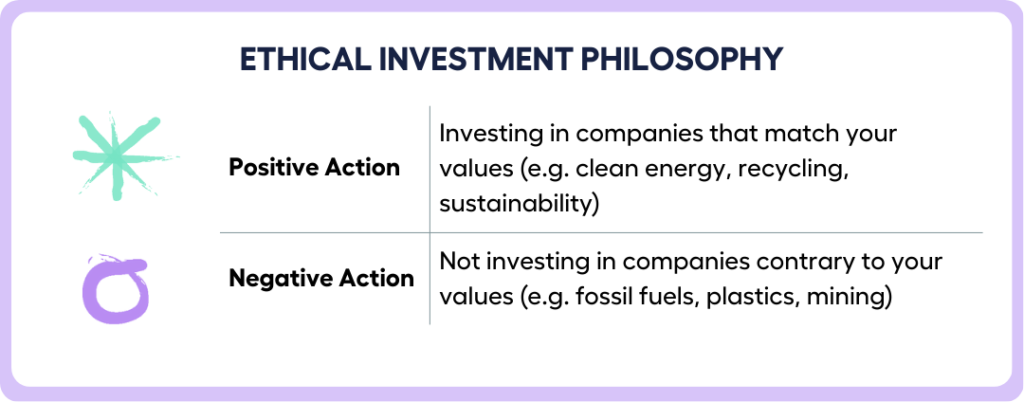
According to 2017 RIAA research, 80% of Australians are willing to switch funds and have their money invested according to their values. This figure climbs to 88% among those aged 18-34.
Ethical Banking
When was the last time you received a bank statement in the mail?
The technology shift in banking is helping us all save resources, but financial institutions can do more beyond online banking and digital statements.
In principle, an ethical bank will not lend money to companies involved in certain products such as fossil fuels, gambling, guns, cigarettes, or live exports.
Ethical banking can also prioritise values such as social and environmental responsibility.
In general, an ethical bank does not have exposure to, invest in, or deal with any of the following:
- Tobacco
- Fossil fuels and coal mining
- Deforestation
- Mining projects
- Weapons (landmines or other arms)
- Human exploitation or neglect of individual needs
- Gambling
- Pornography
- Animal cruelty
Advantages & Disadvantages of Ethical Investing
Ethical investing has pros and cons and varies from investor to investor based on their values and beliefs.
In this overview, we will discuss the benefits and drawbacks of ethical investing and help you determine whether it is a suitable investment strategy for you.
Advantages of Ethical Investing
Ethical investing offers you a chance to earn guilt-free profit in a growing market that positively influences other companies’ practices.
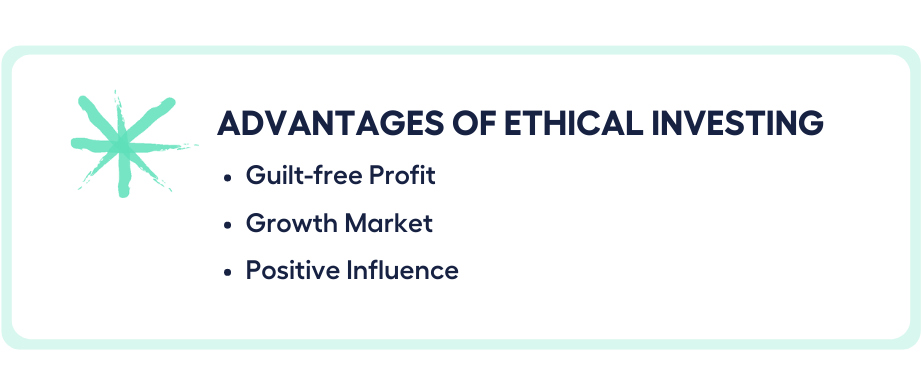
Guilt-free Profit
Guilt-free investment and profit top the list of advantages of ethical investing.
It allows investors to make money while also aligning their investments with their personal values and principles. This can provide a sense of satisfaction and fulfilment that traditional investing may not offer.
Growth Market
Socially responsible investing is gaining popularity now more than ever. With more investors becoming more responsible investors, ethical funds are projected to grow continually. This growth could also have a ripple effect on other responsible investments.
Positive Influence
Since ethical investing’s popularity is on the rise, it could influence other businesses to improve their ethical practices in order to attract investors.
Disadvantages of Ethical Investing
While ethical investing can provide a sense of satisfaction and fulfilment, it can also be time-consuming and come with higher fees than traditional investing. Additionally, ethical investing may not guarantee the same high returns as traditional investing, as the focus is on aligning investments with personal values rather than solely maximising financial gain.
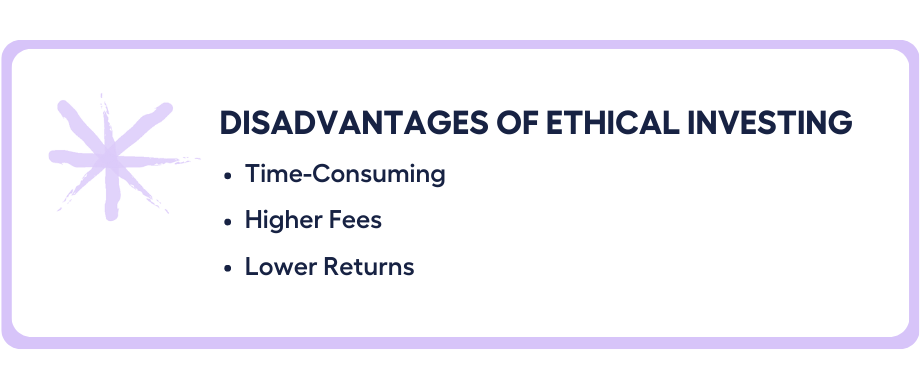
Time-Consuming
Ethical investing is not a passive strategy.
It involves a lot of research and consultation with a professional to ensure that your investment aligns with your values and earns optimal financial gains.
Higher Fees
The fees for ethical investing can be higher due to the research involved in identifying suitable investments and the need for an investment manager to guide you through the ethical investment process.
Lower Returns
The financial returns may or may not be as much as non-ethical funds; thus, the investor may sacrifice financial gains with an ethical approach.
Despite this, many investors are willing to put in the extra time and effort and pay higher fees for the peace of mind that comes with knowing their investments align with their values.
Why is ESG Controversial?
ESG investments don’t come without controversies.
You might be thinking:
What could possibly be wrong with an ESG-based portfolio
if it can help you invest without sacrificing your values and still reach your goals?
ESG investing can be controversial because there is no ESG ratings standard which may result in subjectivity of the criteria used to evaluate companies, the potential trade-off between financial returns and social and environmental impact, and the potential for bias and manipulation in the markets.
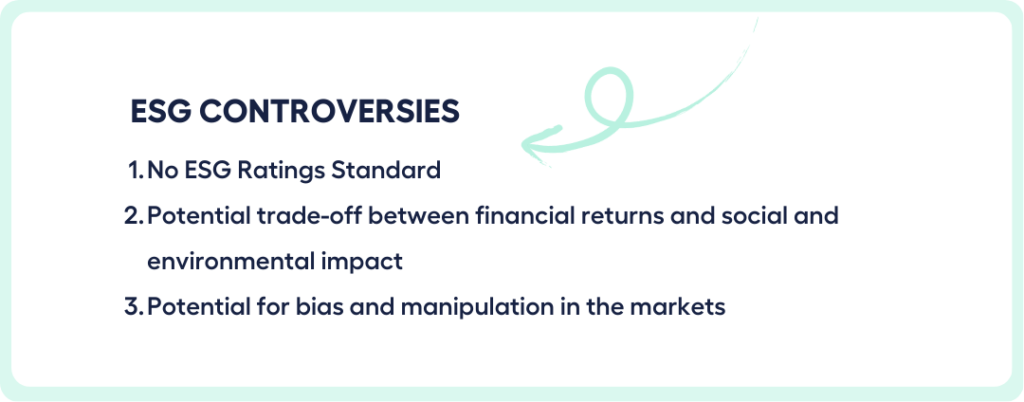
1
No ESG Ratings Standard
Some critics argue that the lack of an ESG Ratings Standard makes it difficult to accurately measure and compare the performance of companies on ESG factors.
A lack of standards, regulations, and transparency has raised concerns that investors will be misled and conflicts of interest will be swept under the rug. As a result, a lack of an ESG Ratings Standard may serve as an obstacle for investors to make informed decisions.
Industry stakeholders have reported that this concern could be addressed by the creation of the International Sustainability Standards Board (ISSB) in 2021. Similar to what the International Accounting Standards Board has sought to do for financial reporting, the ISSB might make a significant difference in ESG investing by requiring businesses to present ESG data in a standardised manner
2
Potential Trade-Off Between Financial Returns and Social and Environmental Impact
Critics contend that choosing assets that score highly on ESG factors may not be the best financial performers and that doing so may mean investors forgo potential rewards in favour of investing in accordance with their personal values.
There is also discussion about whether adding ESG factors to the investment process will make the portfolio less diversified and riskier because some sectors may be excluded.
3
Potential for Bias and Manipulation in the markets
Critics say ESG investment is a kind of politically driven investing that can cause prejudice and market manipulation, citing the culture wars happening in the United States where the ESG movement is being accused of advancing a secretive social and political agenda via their financial clout.
To allay fears of this phenomenon being replicated in Australia, RIAA has revealed that they are on “alert” to ensure that Australian investors are discussing the financial, physical, and fiduciary risks associated with climate change and not using their influence to establish a political identity.
Final Thoughts: Is Ethical Investing Worth It?
Ethical investing assists businesses in gaining access to financing to establish and fund their corporate social responsibility (CSR) operations.
It also enables investors to influence business practices and processes according to their values and ethics.
While there are concerns that ethical investing may result in decreased financial returns on investors’ portfolios, those who do choose to invest ethically find the benefits still make it worthwhile.
To put things in perspective, it is prudent to still focus on your long-term investment strategy. After all, you’re looking after your future and not donating to a charitable institution.
- It’s worth talking to an ethical investment adviser about the advantages and disadvantages of ethical investing according to your financial situation.
A competent ethical investment adviser will pay attention to your concerns and collaborate to build ethical investment solutions close to your heart while also managing the risk associated with that strategy.
Many people may be unaware of this…but just like you, 41% of Aussies intend to get financial advice rather than going it alone, according to an Australian Securities and Investments Commission (ASIC) report.
Find the right Financial Adviser for you with the help of your
My Money Sorted
When you book a call with us, you’ll:
✓ get a better understanding of your money matters
✓ have an idea of the experts you can call on to help you reach your ethical investment goals
✓ be matched with the right financial adviser who can help simplify your journey to financial wellness
My Money Sorted is your stress-free pathway to getting ahead with your money. Here’s what your journey will look like:
Step 1:: Start off with a quick FREE call with a My Money Sorted team member
Step 2: Get matched with a licensed Finance Adviser that’s right for your money situation
Step 3: Take the first step towards your money goals with a clear and sound roadmap prepared by an experienced Financial Adviser.
It’s that easy!






